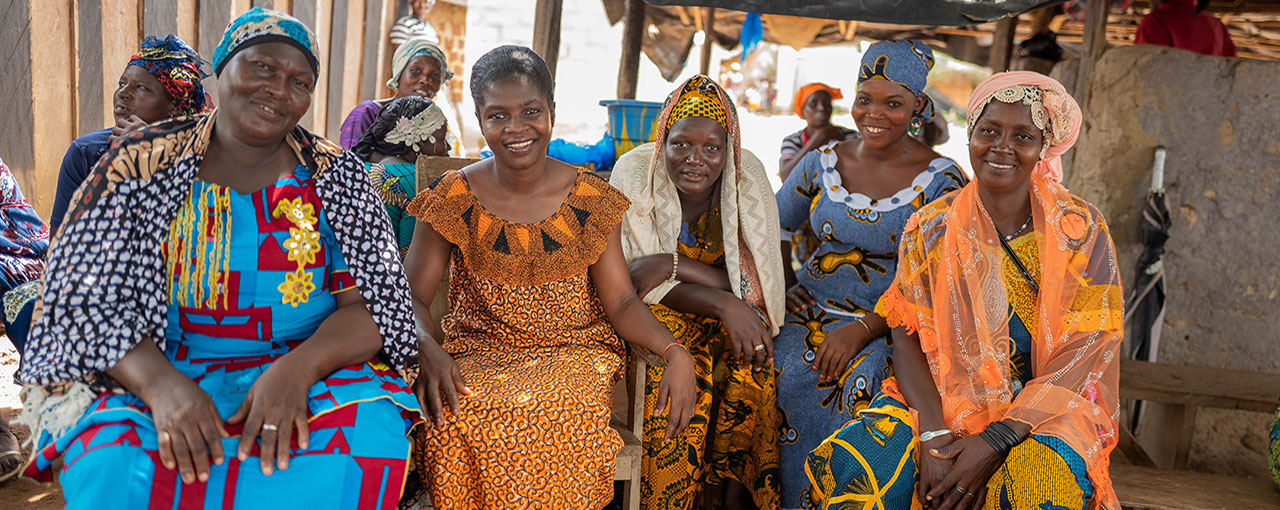Community Wellbeing
We are creating stronger, more resilient cocoa farming communities by investing in the wellbeing and progress of farming families.
The context
Cocoa farming communities face a variety of challenges including low access to services and infrastructure, food insecurity, poverty, child labor, gender inequality, and limited education opportunities. To ensure the wellbeing and resilience of cocoa farming communities and families, Cargill focuses on enabling additional income-generating activities, establishing and maintaining an ecosystem of social services, and providing information on how to improve overall wellbeing.
Providing farm workers with healthcare services, educating the next generation of farmers to a high standard, working to identify and prevent child labor, and giving women more access to economic opportunities are all vital for strengthening the socio-economic resilience of cocoa farmers, families and communities. Such interventions also improve farm productivity, helping to secure cocoa supplies for generations to come.
Our target
One million families benefiting from the services of the Cargill Cocoa Promise by 2030
Our Community Wellbeing Strategic Action Plan provides a roadmap towards achieving our goal of stronger, more resilient cocoa farming communities.
How are we achieving our goal?
Together with our partners, we are implementing community-driven initiatives to help prevent child labor while also enhancing women’s and youth economic opportunities, increasing access to quality education, and improving health and nutrition. To this end, we work with local leaders to conduct Community Needs Assessments and then develop tailored Community Action Plans to accelerate community wellbeing.
Our efforts focus on implementing context-specific programs in the following areas:
Protecting children
Through our Child Labor Monitoring and Remediation System (CLMRS), we work in partnership with the International Cocoa initiative (ICI) to raise awareness about the impact of child labor, identify incidents within the supply chain, and implement remediation and prevention activities such as providing access to birth certificates, school kits and community schools, as well as strengthening school management and establishing child protection committees.
Education
We support access to quality education for children in cocoa communities. Together with partners such as the Jacobs Foundation, we test innovative education approaches, and we build and equip schools with the resources and materials they need to provide quality education for children close to their communities.
Economic opportunities for women
We work to upskill women in cocoa communities via functional and financial literacy training and entrepreneurship trainings. This has a positive ripple effect, since women tend to reinvest any earnings into their families and communities. We also provide access to wider economic opportunities through Village Savings and Loans Associations (VSLAs) and business development, in partnership with CARE, IFC and Empow’Her.
Training and entrepreneurship for youth
We foster capacity building and entrepreneurship to support out-of-school youth at risk of child labor, by helping them to develop the technical, business and life skills they need to find decent jobs and start income generating activities, in partnership with Save the Children, we implement entrepreneurship training for youth at risk of child labor.
Health, nutrition and food security
We deliver nutrition programs to improve diets and nutrition with partners such as CARE and IDH, while our trainings are focused on helping communities get the most from their crops. We also help communities to access clean water and sanitation facilities.
Results from our 2021 sustainability report:
-
51,708 farming households have been monitored through our Child Labor Monitoring & Remediation System (CLMRS) in Côte d’Ivoire, Ghana, Cameroon and Indonesia. We also made initial preparations to set up a CLMRS in Brazil.
-
We implemented more than 2,500 community projects and more than 600 community actions plans, in 2021, with more attention paid to health, nutrition and gender equality.
-
In 2021, 11,359 women participated in 686 Village Savings and Loan Associations (VSLAs)
-
Cargill became a signatory to the United Nations Women’s Empowerment Principles.
If not mentioned elsewise, all West Africa photos in relation to sustainability are by Sandrine Bénitah « @Sandrine Bénitah »

